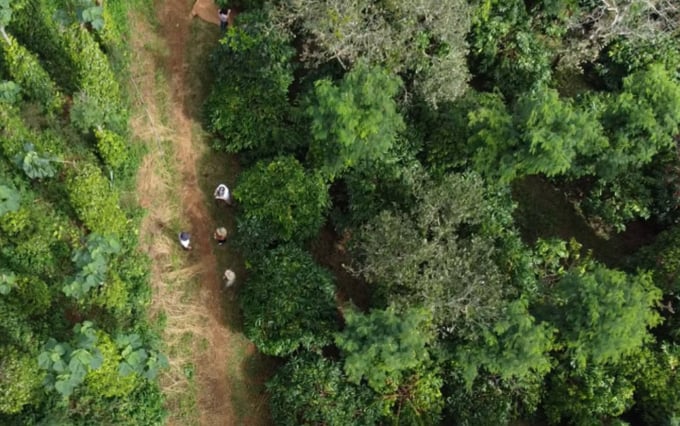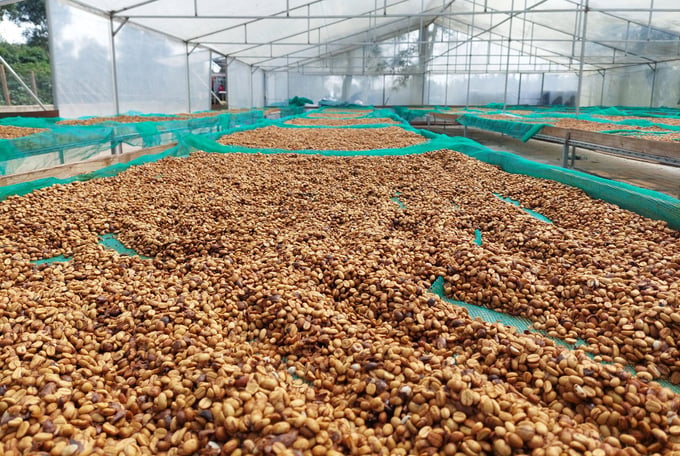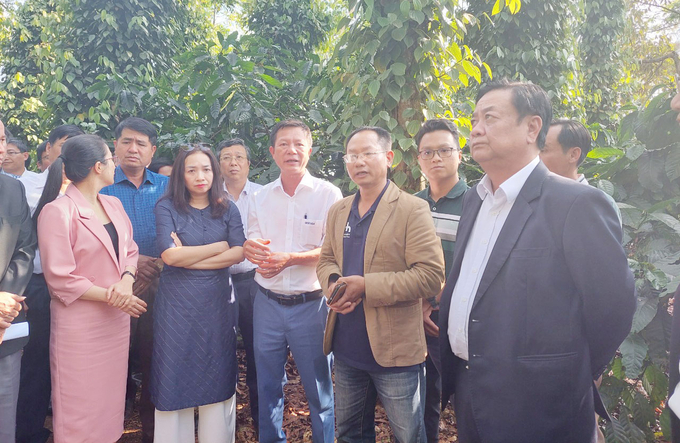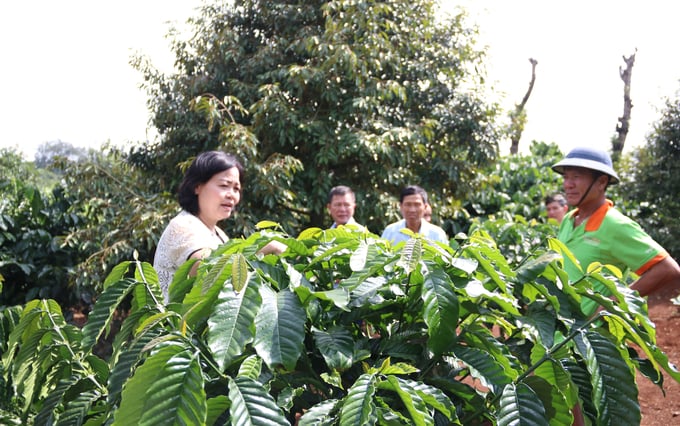May 20, 2025 | 22:52 GMT +7
May 20, 2025 | 22:52 GMT +7
Hotline: 0913.378.918
May 20, 2025 | 22:52 GMT +7
Hotline: 0913.378.918
The price of input materials has increased for the past few years, so traditional coffee cultivation methods are no longer effective. Facing the current situation, the members of the Dak Nong Organic Agriculture Cooperative in Dak R'Moan Commune, Gia City Nghia (Dak Nong) switched to landscape coffee model.
The 255 ha coffee of the members is built according to the landscape coffee model with a 3-storey ecological garden system. In particular, the high tree layer includes fruit trees or trees used as a way to cover the sun, dew and wind and regulate the garden temperature and create additional income sources for farmers. The middle floor is for growing coffee and the lowest is for growing grass vegetation. The application of grass beds in replacement of herbicide overuse helps farmers save water for irrigation as the grass beds reduce water evaporation and moisture retention.

The 255 ha coffee of the members is built according to the landscape coffee model with a 3-storey ecological garden system. Photo: Quang Yen.
According to Mr. Pham Van Thach, Director of Dak Nong Organic Agriculture Cooperative, in order to ensure the organic coffee model, the cooperative members choose land that is not located in polluted areas like factories and residential areas. "The success of the model is thanks to the support from the VnSAT project as well as other local projects. Without the companionship from the projects, it would have been very difficult for the cooperative to successfully build a landscape coffee model like this”.

Participating in the landscape coffee model helps farmers reduce costs and sell products at a much higher price. Photo: Quang Yen.
Similarly in Dak Lak, a cluster of sustainable coffee landscapes is implemented by the 2/9 Import-Export Company Limited (Simexco) in Dak Lak in collaboration with the Western Highlands Agriculture and Forestry Science Institute (WASI), the Sustainable Trade Initiative - IDH and the Vietnam - Sustainable Agriculture Transformation (VnSAT) Project. With a total area of 5,200 ha, approximately 4,000 farmers in 3 communes Ea Tan, Ea Toh and Dlie Ya (Krong Nang district) participated in the project and initially experienced many positive changes.
“After joingin the sustainable landscape coffee program, I was trained to take care of coffee, reduce the amount of chemical fertilizers, increase the amount of organic microbial fertilizers, and use irrigation water effectively. We were instructed by the agricultural staff to create a multi-storey garden from high to low, and arranged it appropriately with ventilation and light, so the plants are green all year round. With this, the productivity will be and we have stable incomes. And it’s not just coffee, the family also harvests from other crops in the garden," said Mr. Ta Duy Thanh (Ea Tan commune, Krong Nang district).
According to the leader of Simexco Dak Lak, in order to create a sustainable coffee material area, since 2009 the business has connected with over 8,500 farmers in the whole province, cultivating coffee on a total area of over 12,000 ha.

Minister of Agriculture and Rural Development Le Minh Hoan visited the landscape coffee model in Ea Tan commune, Krong Nang district, Dak Lak province. Photo: Quang Yen.
Landscape coffee takes coffee as the main factor. The design of intercropping with sunshades, windbreaks, cover crops, isolation belts helps the garden to be more beautiful and helps coffee grow better even in adverse weather. The landscape coffee program aims to increase the value of coffee and income of the people as the coffee in the landscape cluster is processed in a direction to make high quality and specialty coffee products.
“Developing landscape coffee is a foreseeable direction. Landscape coffee farming is the process of perfecting, improving and promoting the coffee sub-ecosystem to approach the forest ecosystem effectively and sustainably in all three aspects of economy, society and environment,” said the leader of Simexco Dak Lak.

Landscape coffee helps this industry develop sustainably. Photo: Quang Yen.
Mr. Nguyen Hoai Duong, Director of Dak Lak Department of Agiculture and Rural Development, said that developing high quality coffee in a green and sustainable direction is considered an important orientation for production, processing and preservation. It has an important contribution to improving the value of the province's coffee industry, bringing high profits for growers, cooperatives and businesses. “Green growth is associated with the goal of a low-carbon economy, enriching natural resources. It has become a mainstream trend in sustainable economic development, circular economy. This is an imperative and important direction in current and future socio-economic development”.
Studies have shown that the landscape coffee model has contributed to a 14% reduction in the amount of chemical fertilizers and 17% of irrigation water; 11% of production costs and 10% of greenhouse gas emissions into the environment. 100% of the coffee produced in the pilot area is purchased at a price higher than the market price for other common coffee products.
Translated by Samuel Pham

(VAN) Japan's grant aid project contributes to capacity building, promoting organic agricultural production, and fostering sustainable community development in Dong Thap province.

(VAN) For years, the CRISPR-Cas9 genome technology has been reshaping genetic engineering, a precision tool to transform everything from agriculture to medicine.

(VAN) Vietnam aims to become a 'leader' in the region in the capacity and managing effectively soil health and crop nutrition.
![Reducing emissions from rice fields: [Part 1] Farming clean rice together](https://t.ex-cdn.com/nongnghiepmoitruong.vn/608w/files/news/2025/05/05/z6509661417740_a647202949c539012a959e841c03e1d3-nongnghiep-143611.jpg)
(VAN) Growing clean rice helps reduce environmental pollution while increasing income, allowing farmers to feel secure in production and remain committed to their fields for the long term.
/2025/05/19/5136-1-144800_230.jpg)
(VAN) The Nghe An Provincial People's Committee has just approved the list of beneficiaries eligible for revenue from the Emission Reductions Payment Agreement (ERPA) in the North Central region for the year 2025.

(VAN) 14 out of 35 domesticated elephants in Dak Lak province have had their living conditions improved, with 11 of them currently participating in the non-riding elephant tourism model.

(VAN) Muong Nhe Nature Reserve hopes that being upgraded to a national park will lay the foundation for forest protection efforts to be carried out in a systematic, modern, and sustainable manner.